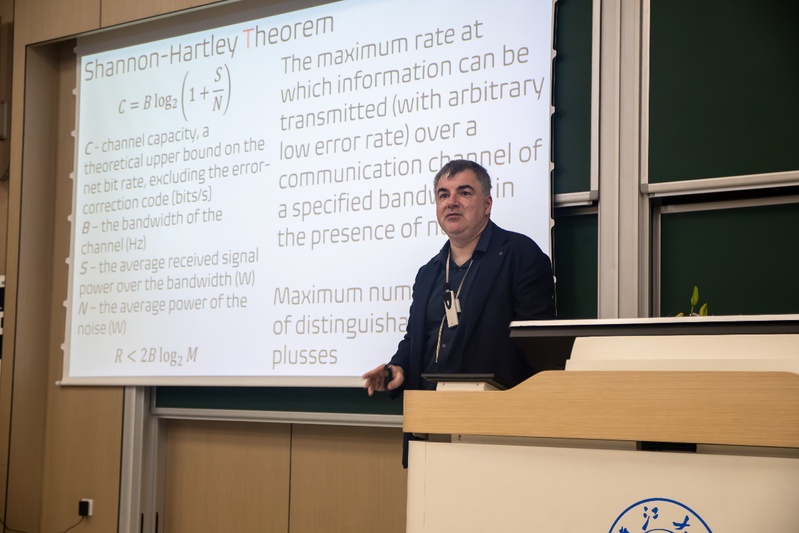
On the evening of April 24, 2025, the course Physical Problems in Information Technology, taught by 2010 Nobel Prize in Physics laureate Konstantin Novoselov under Zhejiang University’s ''Global Distinguished Educator Program''course , officially commenced at Zijingang Campus.
Attendees included Prof. WANG Jingdai, Vice President of Zhejiang University; Ms. XIANG Shufang, Director of Office of Talent Management; Prof. JIANG Quanyuan, Vice Dean of Undergraduate Studies; Ms.NI Jiani, Deputy Director of the Graduate Education Office; Mr. FAN Yifan, Deputy Director of Office of Talent Management; Prof. CHEN Hongsheng, Dean of the College of Information Science and Electronic Engineering; Mr. SUN Qi,Chairman of College of Information Science and Electronic Engineering Council. The course co-lecturer and key facilitator of Novoselov’s recruitment, Prof. LIN Shisheng, hosted the opening ceremony.
Prof. Wang Jingdai presented Prof. Novoselov with an honorary plaque, while student representatives offered flowers to warmly welcome him to attend Zhejiang University’s ''Global Distinguished Educator Program''.


Prof. Lin Shisheng spent 45 minutes to introduce the course’s background, objectives, structure, and assignments to enrolled students. Drawing from the university’s motto, Seeking Truth and Pursuing Innovation, he used the concept of infinitesimal in calculus as a starting point to explore deeper understandings of the objective world. He emphasized that advancements in modern information technology rely on identifying and solving physical challenges. With well designed course series and problem-oriental teaching style, he urged students to approach innovation through interdisciplinary perspectives.

“If a coin has identical patterns on both sides, how much information can we gain by flipping it?” With this thought-provoking question, Prof. Konstantin Novoselov gave the first lecture, titled Introduction to Information Technology, using witty and engaging language. Starting from Shannon’s information theory, he systematically dissected the essence, implications, and applications of information. By interpreting the concept of “entropy,” he bridged the physics of entropy with Shannon’s information entropy, revealing their intrinsic connection in describing disorder and uncertainty in systems, showcasing the unique allure of cross-disciplinary research. Throughout the lecture, he highlighted well-known fields like integrated circuits, tracing their development and current technological trends. He stressed that breakthroughs in performance rely on innovations in foundational materials and devices, encouraging students to explore unresolved fundamental physical challenges through multidisciplinary lenses.


Over 150 students from diverse major backgrounds enthusiastically engaged in lively discussions with the professor on course design, theoretical applications, and innovation pathways. After class, students lingered to delve deeper into specific research topics with Prof. Novoselov.

The course Physical Problems in Information Technology traverses the century-long evolution of modern information technology, using physical challenges in the field as a foundation to demonstrate how fundamental science has shaped the IT revolution. Through Prof. Novoselov’s dynamic lectures and vibrant student interactions, interdisciplinary ideas collided and merged, injecting fresh vitality into future academic research and technological innovation.

In subsequent sessions, Prof. Novoselov and Prof. Lin Shisheng will co-teach, diving into cutting-edge topics such as semiconductor physics and 3D devices, superconductivity and superfluidity, graphene and low-dimensional materials in nanotechnology, sophisticated scientific instruments, quantum mechanics, and AI large-scale models. These discussions aim to foster innovative thinking, systematic problem-solving skills, and the ability to ask profound questions.

The College of Information Science and Electronic Engineering is committed to cultivating globally competitive leaders with innovative prowess. By inviting top scholars through the ''Global Distinguished Educator Program'', the university not only offers students unparalleled opportunities to learn from world-class minds but also builds a critical platform for interdisciplinary collaboration.

